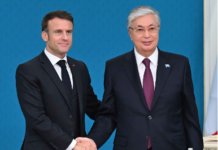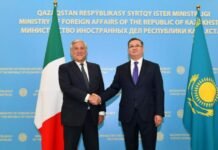By Ernest Gallo
Last week, EU officials held a confidential briefing during which they established a country-specific approach to win over the so-called “Priority Four” countries that includes Brazil, Chile, Nigeria and Kazakhstan. Each represents a certain interest for the European Union to advance its positions in a highly “competitive geopolitical environment.” Brazil and Chile are leaders in raw material-rich Latin America. Nigeria is an economic driver of West Africa. Kazakhstan, meanwhile, is a powerhouse of Central Asia with untapped energy, rare earth minerals and other resources.
Kazakhstan is also the only country in its region that has launched democratic reforms and stands ready to advance its relations with European countries and institutions. This means that cooperation between the EU and Kazakhstan, as well as developments in the country will be in the spotlight going forward.
In light of this, concerns were most likely raised within the EU when on April 10, around 80 laid-off oil workers from Zhanaozen, a city in the Mangistau Region, arrived in Astana and set up camp outside Kazakhstan’s Ministry of Energy to demonstrate. They worked for the BerAli Mangistau company that failed to win a tender for Ozenmunaygas’s oilfield services, which is a subsidiary of state-owned oil and gas company – KazMunayGas (KMG).
Since January last year, any demonstrations by oil workers from the Mangistau region tend to be a source of greater concern for Kazakh authorities and those interested in preserving Kazakhstan’s stability, including the EU.
The workers demanded stable jobs and salaries, and pledged to stay outside the ministry until their demands are satisfied. KMG and BerAli Mangistau established a special working commission to negotiate differences. They offered employment opportunities in other companies, retention of an average salary ($1,550), social packages, and good working conditions. The offer was rejected and the workers demanded employment at Ozenmunaygas. KMG explained that in line with existing legal procedures, such demands are illegal as they bypass Ozenmunaygas’s hiring rules that provide work for the unemployed in Zhanaozen on a first-come, first-served basis.
At the end, the leaders of the demonstrators said that most of the oil workers who had gathered would return home to Mangistau and a small group would remain to continue negotiations with the KMG. Fortunately for all sides, this disagreement is being resolved peacefully through negotiations, with no indication that violence could occur. As a result, the road to closer ties between the EU and Kazakhstan remains open.
However, not all organisations see it this way. The International Trade Union Confederation (ITUC) in Brussels released a statement earlier in April stating that Kazakhstan mismanaged its oil resources and should be held accountable for this. The statement alleges that “this is typical of the corrupt way in which oil and gas is run in Kazakhstan, all at the expense of working people. KMG moves contracts between different operating companies to run down working conditions. These companies fire their workers when they lose contracts and the new, winning company re-employs some, but not all, and usually on worse conditions.”
Given the seriousness of the allegations, it is necessary to study this issue further.
According to KazMunayGas’ statement released on April 25, the procurement at the company is based on the principles of value for money, openness and transparency of the procurement process, fair competition, and prevention of corruption. In the selection of contractual partners, the company is guided by a combination of factors, including the best price, quality and conditions, and business reputation of the contractual partner. Contractors are required to comply with the law, treat employees fairly, ensure safe working conditions, and protect the environment. These conditions are included by default in the terms of contracts concluded by KMG with its contractual partners. Free access to information on procurement is provided to all interested parties.
In addition, the Electronic Procurement Information System, through which procurement is carried out, has an effective internal control system, including appeals against the results of procurement. if a violation is confirmed, the results of the procurement are cancelled and reviewed. Those responsible for any violations, including senior management, are subject to disciplinary action.
This approach is based on the Public Procurement Model Law (2011), developed and recommended by UNCITRAL (United Nations Commission on International Trade Law). These principles ensure transparency of procurement through e-procurement, equal opportunities for all participants, as well as the possibility to contest the results of tenders.
Ultimately, the procurement process used by KMG is in line with international standards, which is contrary to what ITUC is alleging.
There are also concerns about the credibility of the International Trade Union Confederation itself. A major corruption scandal involving Luca Visentini, ITUC’s General Secretary, came to light at the end of 2022. He allegedly received bribes from the Qatari government, in exchange for cleaning up the country’s image in advance of the 2022 World Cup. An investigation by the Brussels daily Le Soir uncovered the scandal, leading to Visentini’s arrest and later sacking from his role at ITUC. Luca Visentini also admitted to accepting a €50,000 donation from Fight Impunity, a non-profit organisation in Brussels, which is suspected of being exploited to launder money.
In light of these scandals, questions remain about the credibility of reports, statements and policies by ITUC. There are concerns that such statements can be a result of lobby efforts, in this case one that is directed against Kazakhstan.
Overall, the issue of KMG procurement and the Mangistau workers will likely remain in the spotlight until fully resolved, though for now it seems the situation is being handled by KMG in line with the law and international standards.
Ernest Gallo is a researcher in the sphere of international relations, with a particular focus on energy security.





